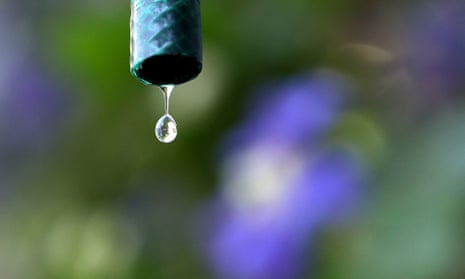Millions of households in the north-west of England will face the first hosepipe ban in the country since 2012 after the UK’s longest heatwave in more than 40 years.
The water company United Utilities said 7 million customers would be affected by the ban, which is due to come into force on 5 August.
Martin Padley, the company’s water services director, said: “Despite some recent rainfall, reservoir levels are still lower than we would expect at this time of year. With forecasters predicting a return to hot dry weather for the rest of July, we are now at a point where we will need to impose some temporary restrictions on customers.”
Soaring summer temperatures have seen utilities companies across England urging customers to be careful about their water usage, but United Utilities is the first to announce a hosepipe ban.
The “temporary use ban” will apply to customers in Merseyside, Lancashire, Greater Manchester and Cumbria, with the exception of Carlisle and north-east Cumbria’s Eden District.
Padley said: “It is not a decision we have taken lightly and we are enormously grateful to customers for having helped reduce the demand on our network over the last couple of weeks, but unless we get a period of sustained rainfall before 5 August these restrictions will help us safeguard essential water supplies for longer.”
In Northern Ireland, a hosepipe ban has been in effect since 29 June, with an extra 175m litres of water being pumped into the network in an effort to keep up with demand.
But in the north-west of England, where rain is more frequent, reservoir levels have plummeted in the unusually hot conditions. According to United Utilities, reservoir levels in the region are 17% lower than the same period last year.
Other utilities firms – including Severn Trent Water, South Staffs Water, Anglian Water, Northumbrian Water, Bristol Water and Thames Water – all said they were not planning hosepipe bans when contacted on Monday.
The ban in north-west England restricts the use of hosepipes or sprinklers for watering private gardens and washing cars but customers will still be able to use watering cans and wash their vehicles with a bucket and sponge, United Utilities said.
Sarah Kent, a Met Office meteorologist, said that other than the odd shower there was no significant rainfall expected in the north-west of England during the next week. “There’s a lot of fine and dry weather in the forecast and with the exception of showers, there’s not any significant rainfall expected over the next week,” she said.
A hosepipe uses about 540 litres an hour, as much as a family of four would use in one day, while a sprinkler left running overnight uses as much water as that family would use in one week.
A hosepipe ban can reduce water usage by 5-10%, according to UK Water Industry Research, which in the north-west would amount to more than 100m litres a day.
United Utilities said the ban was alongside the company’s efforts to maintain essential supplies, including maximising water abstraction from groundwater supplies, moving water around its regional integrated network of pipes, and running a campaign to encourage customers to use water wisely.
Carlisle and the north-eastern corner of Eden District are exempt because they receive their water from discrete supply network zones fed by local water sources that have not been so badly affected by the overall lack of rainfall, the company said.










